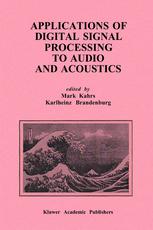

Most ebook files are in PDF format, so you can easily read them using various software such as Foxit Reader or directly on the Google Chrome browser.
Some ebook files are released by publishers in other formats such as .awz, .mobi, .epub, .fb2, etc. You may need to install specific software to read these formats on mobile/PC, such as Calibre.
Please read the tutorial at this link: https://ebookbell.com/faq
We offer FREE conversion to the popular formats you request; however, this may take some time. Therefore, right after payment, please email us, and we will try to provide the service as quickly as possible.
For some exceptional file formats or broken links (if any), please refrain from opening any disputes. Instead, email us first, and we will try to assist within a maximum of 6 hours.
EbookBell Team

4.0
76 reviewsKarlheinz Brandenburg and Mark Kahrs With the advent of multimedia, digital signal processing (DSP) of sound has emerged from the shadow of bandwidth limited speech processing. Today, the main appli cations of audio DSP are high quality audio coding and the digital generation and manipulation of music signals. They share common research topics including percep tual measurement techniques and analysis/synthesis methods. Smaller but nonetheless very important topics are hearing aids using signal processing technology and hardware architectures for digital signal processing of audio. In all these areas the last decade has seen a significant amount of application oriented research. The topics covered here coincide with the topics covered in the biannual work shop on “Applications of Signal Processing to Audio and Acoustics”. This event is sponsored by the IEEE Signal Processing Society (Technical Committee on Audio and Electroacoustics) and takes place at Mohonk Mountain House in New Paltz, New York. A short overview of each chapter will illustrate the wide variety of technical material presented in the chapters of this book. John Beerends: Perceptual Measurement Techniques. The advent of perceptual measurement techniques is a byproduct of the advent of digital coding for both speech and high quality audio signals. Traditional measurement schemes are bad estimates for the subjective quality after digital coding/decoding. Listening tests are subject to sta tistical uncertainties and the basic question of repeatability in a different environment.